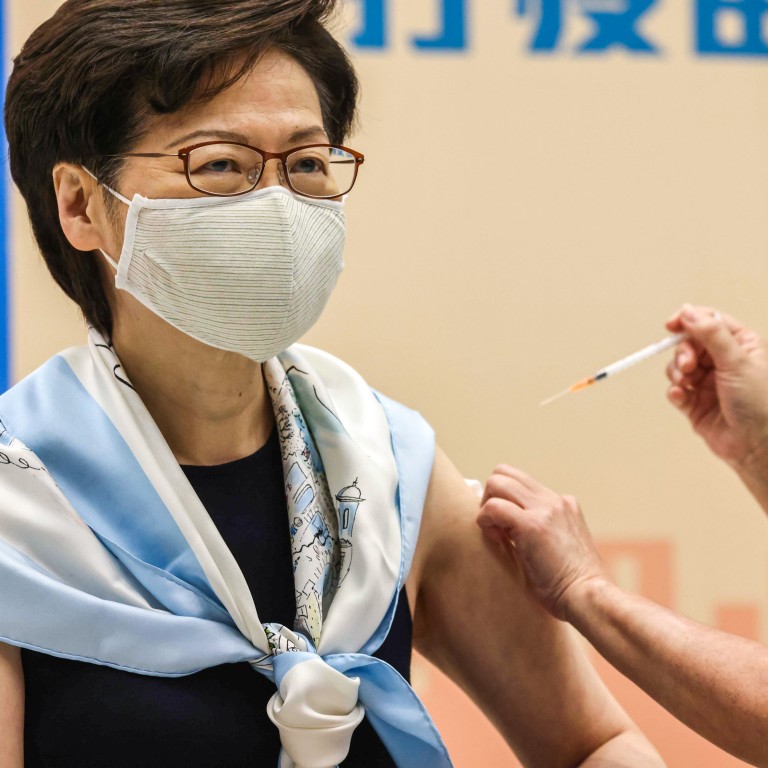
Coronavirus: Hong Kong leader blasts vaccine fearmongering, smear campaign against Sinovac jab; city logs 18 new cases
- Carrie Lam singles out some medical workers to accuse them of spreading falsehoods about the Chinese-made vaccine
- Chief executive says city authorities are looking at bolstering Hong Kong’s Covid-19 fight by procuring a fourth type of vaccine
The city logged 18 new cases, five of which were tied to a cluster at the Ursus Fitness gym in the Sai Ying Pun neighbourhood popular with expatriates, taking the total to 147, while 11 infections were imported from the Philippines, Indonesia and Pakistan. More than 10 people tested preliminary-positive, including three linked to the gym. The city’s tally of confirmed coronavirus cases stands at 11,397 with 203 deaths.
Speaking after she and other officials received a second Sinovac shot, Lam criticised people who were making unfavourable remarks about the vaccine.
“I would condemn people who are using social media or other means to spread false information, engage in alarmist behaviour and even smear the domestically made vaccines,” Lam said. “It is even more heartbreaking when some among them are medical professionals,” she added, without specifying who exactly she was referring to.
Last week, health officials accused the Hospital Authority Employees Alliance of spreading misinformation about the Sinovac vaccine. The alliance insisted it was only trying to warn older residents about the dangers of receiving the vaccine, which the group said lacked sufficient clinical trial data.
Lam said authorities were looking at bringing another type of vaccine to Hong Kong.
“Up to this moment, nobody can be very authoritative on how long the vaccine can protect the individual and the community,” Lam said. “That’s why we need four different vaccines each with a volume of 7.5 million doses.”
She said health officials were still studying which vaccine to buy, as well as the type of technology underpinning the jabs.
Hong Kong’s vaccination programme currently uses two types of shots, one made by mainland Chinese company Sinovac and the other developed by German company BioNTech and the American pharmaceutical giant Pfizer, but distributed by the mainland’s Fosun company. A deal has also been struck with British-Swedish firm AstraZeneca, giving the city a total of 22.5 million doses.
Lam continued to urge residents to get inoculated, stressing the Sinovac and BioNTech jabs were safe and that vaccination was key to preventing the spread of the coronavirus globally.
According to the latest official figures, about 379,600 residents – or roughly 5.8 per cent of Hongkongers aged 16 and above – have been vaccinated, and the first batch of people started getting their second round boosters on Monday.
But government health adviser Professor David Hui Shu-cheong of Chinese University warned that people who had experienced side effects such as hives, difficulty breathing or swollen lips after their first jab should not get a second one.
“If you have experienced these side effects but still want to take the second shot or switch to a different vaccine, it would be best to see a doctor and figure out what you are allergic to first,” Hui told a radio show.
Coronavirus: what can Hong Kong do to give faltering Covid-19 vaccination scheme a boost?
The government’s expert committee on vaccines was looking into setting up a mechanism to allow people to switch to a different vaccine if they experienced severe side effects from the first dose, it was revealed on Sunday.
The University of Hong Kong (HKU) said it would soon recruit at least 50 people to participate in a study on switching vaccines. Hui said while there were currently no large-scale studies on the matter, interested residents could still volunteer to take part in the research.
Meanwhile, HKU microbiologist Dr Ho Pak-leung urged the government to offer residents incentives to raise the vaccination rate.
“They need to provide incentives that residents will not be able to resist, such as border crossing, travel to places where the pandemic situation isn’t too bad or allowing vaccinated people to dine out in larger groups,” Ho said.
While the vaccination rate of about 5 per cent was “not bad”, Ho said incentives would encourage more people to get jabs within a shorter time frame.
Authorities announced mandatory testing for about 100 coworkers of a clerk working at a construction site on Cha Kwo Ling Road in Kwun Tong after the employee was confirmed as infected and listed as one of two untraceable new cases. The site must close for 14 days. The other untraceable case involved a taxi driver who lives at Siu Sai Wan Estate.
Screening was also ordered for about 330 pupils and staff members at Cannan Kindergarten on Waterloo Road in Kowloon Tong after the school reported an outbreak of respiratory tract infections that left six students ill.
Officials are also checking whether the infection of an 88-year-old man, who was among the preliminary positive cases, was related to two earlier ones, as all had previously visited Chiu Fook Cuisine in Lam Tin.


